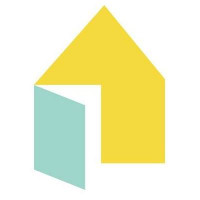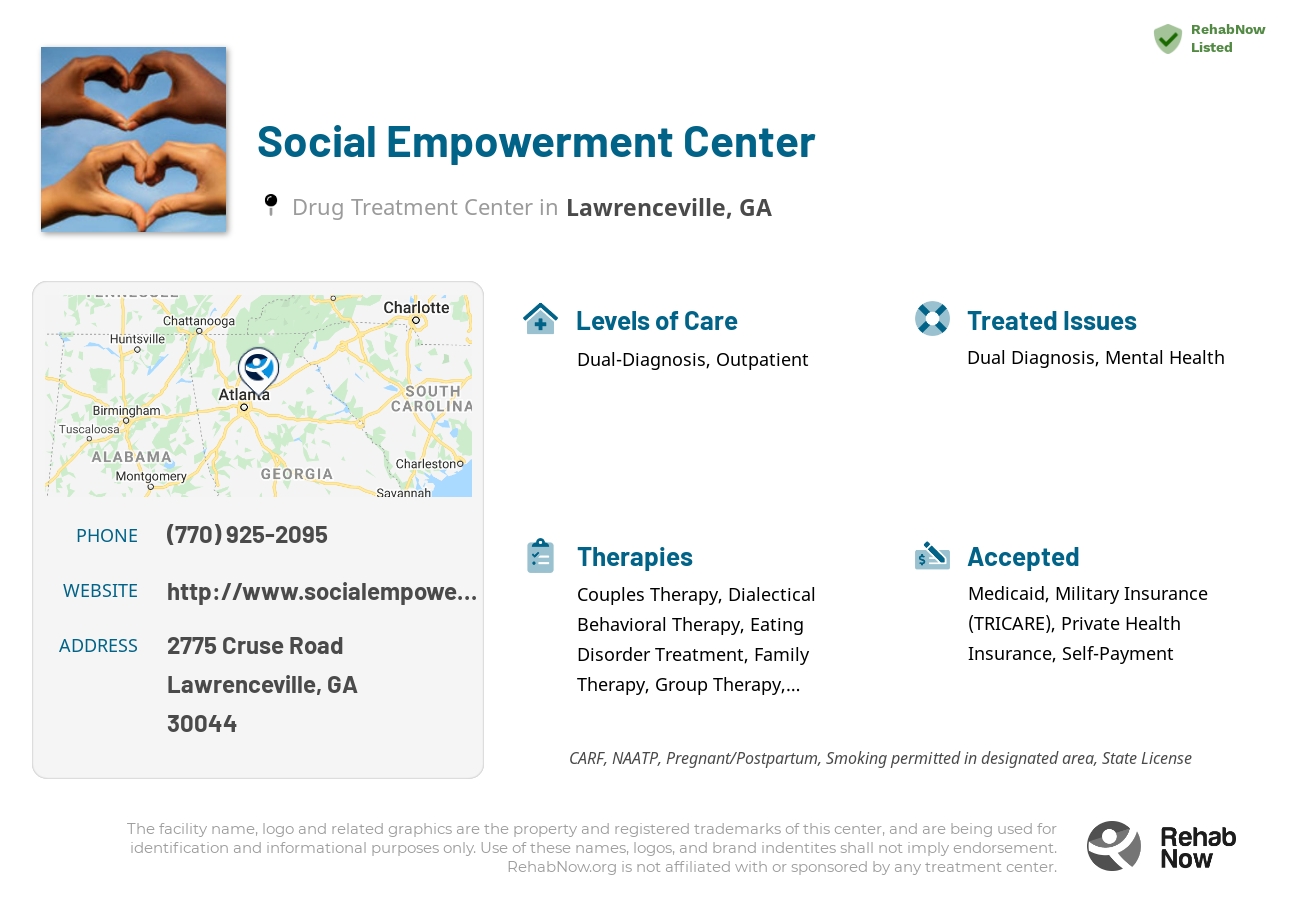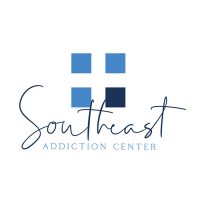
Social Empowerment Center
Drug Rehab Center in Lawrenceville, Georgia
- Mental Health
- Eating Disorder
- Dual Diagnosis
The Social Empowerment Center in Lawrenceville, Georgia is an addiction treatment center that provides comprehensive and specialized care to individuals struggling with substance use and mental health issues, offering personalized treatment plans and access to experienced professionals.
About Social Empowerment Center in Georgia
Social Empowerment Center in Lawrenceville, Georgia is an addiction treatment center providing comprehensive and specialized care to those struggling with substance use, mental health, and dual-diagnosis issues. Founded on the belief that recovery is possible, the facility offers personalized treatment plans to its clients, as well as access to a team of experienced and compassionate professionals. Services provided by Social Empowerment Center include individual and family counseling, medical and psychiatric evaluations, medication-assisted treatment, and group therapy. All of these are tailored to meet the specific needs of each individual, while striving to empower the client to make positive changes in their lives.
In addition to the personalized treatment plans offered, Social Empowerment Center also offers a variety of other services, such as trauma-informed care, relapse prevention, and aftercare planning. Each of these services has been designed to guide and support the client through their recovery journey, helping them to develop the skills needed to maintain sobriety. Accreditations and licenses include the Joint Commission and the Georgia Department of Behavioral Health & Developmental Disabilities, ensuring that clients receive the highest level of care.
Genders
Ages
Modality
Additional
Conditions and Issues Treated
Levels of Care Offered
This center offers a variety of custom treatment tailored to individual recovery. Currently available are Dual-Diagnosis, Outpatient, with additional therapies available as listed below.
“Outpatient treatment is ideal for those who have a lower intensity addiction. It’s also suitable for those with a supportive environment and those on a tight budget.
Outpatient treatment can be considered the lowest intensity level of addiction treatment. It is ideal for early phase addiction or lower intensity addictions. It may involve weekly sessions instead of daily. Peer group support, 12-step programs, and individual counseling may still be used and anti-addiction medication.
Therapies & Programs
No single treatment works for all addicts; therefore, the goal of treatment and therapy should be to find what works best for each individual. Some people requiring addiction treatment may only need a few weeks of inpatient care. Others will require long-term residential care. Tolerance and withdrawal levels vary from person to person and thus affect the intensity of the treatment needed.
If an individualized approach to treatment and therapy is not offered, addicts may fail to reap benefits from their efforts. Professionals must customize plans according to their patient’s needs, limitations, and strengths. The goal of all forms of addiction treatment should be for addicts to find healthy ways to cope with their addiction and its underlying causes.
Couples therapy for drug addiction is a unique form of therapy that allows family members to work through the emotional issues of their loved one’s addiction together. Family members can support each other while learning how to cope with the addiction and encourage healthy changes.
Accordingly, couples therapy for drug addiction is designed for an addict and their significant other or spouse. The two will work with a therapist to learn how the addiction affects themselves and the relationship and how to break the negative patterns of behavior that may have developed.
Drug addiction can destroy a person’s life, as well as their family and friends. The loss of one’s ability to choose how to live and behave often leads the addict into depression, anger, guilt, and many emotional problems.
The therapies usually include siblings, children, and parents who are involved in their daily lives. These sessions are vital because they address past issues that may have hampered an addict’s or alcoholic’s recovery and provide support at a crucial time!
One of the most critical aspects of family therapy is helping addicts’ loved ones see their situation in a new light. It’s also one of the most challenging things a family can do when a loved one struggles with addiction or alcoholism.
Group therapy is held in a safe, controlled setting where patients can feel comfortable sharing their struggles and gaining perspective through shared conversations. It takes place in a group rather than one on one to prevent feelings of isolation or being unique in their situation while creating an environment for addicts at Social Empowerment Center to develop fellowship, accountability, and support. Group therapy is an important tool in recovery that prevents cravings that prompt a return to active addiction.
This type of therapy involves the use of a variety of therapeutic techniques to help addicts recover from past traumas that might have triggered their substance abuse. During these sessions, therapists will work with the addict to address painful memories and learn how to cope effectively with stressors as they arise.
During these types of sessions, therapists will typically focus on three main goals:
- Identifying and expressing painful emotions associated with past traumas.
- Reducing the effects of stress on an addict’s life by developing more effective coping mechanisms.
- Developing healthy ways of thinking about stressful situations that can help addicts avoid substance abuse issues in the future.
This type of therapy is typically used in conjunction with other types of addiction treatment services. By identifying and dealing with the root cause of addiction, most addicts can overcome their cravings and prevent relapse once they leave rehab.
Many different types of addiction treatment services exist to help addicts safely get sober, but it’s important for recovering individuals to find a therapist or support group that will help them address the root cause of their addiction.
Dialectical Behavior Therapy is a form of Cognitive Behavioral Therapy that helps patients understand the relationship between their thoughts, feelings, and behaviors. It is beneficial for those whose addictions and behaviors stem from severe mental health issues. It aims to help the patient achieve their goals and identify how they can enhance their lives.
Cognitive-behavioral therapy is a talking-based method that helps people struggling with addiction replace destructive behaviors with healthier ones. CBT also helps them identify the underlying thoughts and beliefs that cause these behaviors in the first place and ways to control those thoughts and feelings. It can be administered as a holistic therapy or as part of combination therapy and—as opposed to turning to drugs and alcohol—helps addicts learn how to respond to negative thoughts instead.
Payment Options Accepted
For specific insurance or payment methods please contact us.
Is your insurance accepted?
Ask an expert, call (888) 674-0062
Additional Details
Specifics, location, and helpful extra information.
Lawrenceville, Georgia 30044 Phone Number(770) 925-2095 Meta DetailsUpdated November 25, 2023
Staff Verified
Social Empowerment Center Patient Reviews
There are no reviews yet. Be the first one to write one.
Lawrenceville, Georgia Addiction Information
Prescription opioid use has caused a large increase in the total amount of overdoses in Georgia. Almost 12% of the Georgia population uses illicit drugs each year, and slightly over 3.5% also abuses alcohol at the same time. This does not include those who binge-drink at least once a month, which includes 20% of all Georgians.
Treatment in Nearby Cities
- Washington, GA (78.7 mi.)
- Roswell, GA (16.7 mi.)
- Douglas, GA (182.8 mi.)
- College Park, GA (28.6 mi.)
- Alma, GA (191.0 mi.)
Centers near Social Empowerment Center


The facility name, logo and brand are the property and registered trademarks of Social Empowerment Center, and are being used for identification and informational purposes only. Use of these names, logos and brands shall not imply endorsement. RehabNow.org is not affiliated with or sponsored by Social Empowerment Center.




